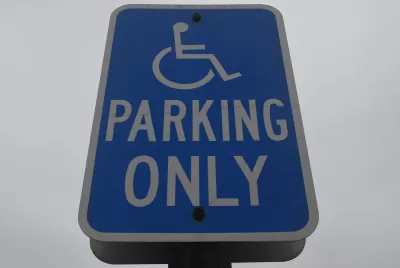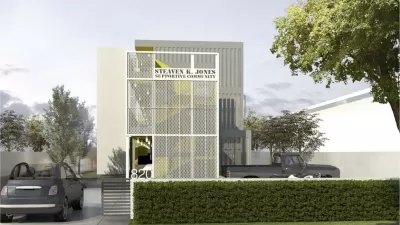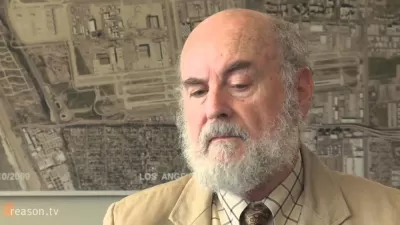The fine for misuse of a placard will increase considerably, but not everyone agrees this is the right way to address a growing problem.

The Los Angeles City Council recently voted to raise the fine for misuse of disabled placards from $250 to $1,100. The placards allow users to park free and for an unlimited amount of time in metered spaces, and abuse is rampant. The practice means that people who need access to disabled parking spaces often cannot find available spots.
But the focus on enforcement and fines is not a universally accepted strategy. Fernando Torres-Gil and Donald Shoup at UCLA say limiting the number of placards handed out would be a more effective tactic, reports Sonja Sharp:
The so-called two-tier system would divide California’s current placard holders — roughly 2.5 million people, or about 6% of the population — into those with severe mobility impairments and those whose disabilities are less physically limiting, shearing the latter class of many of their existing protections.
But many disability rights advocates do not support this approach, arguing that it stems from the perception that disabilities are always obvious and that many people who have placards do not deserve them. "The obsession with fraud creates a 'culture of harassment' for people who may not fit the public image of disability — wheelchair users who also walk, gym-rat amputees and young mothers with multiple sclerosis and infant seats in their cars," notes Sharp.
Supporters of the tiered system say that the majority of individuals considered disabled under the Americans with Disabilities Act do not have severe mobility impairments. As a result, the status of those who do receive placards would be legitimized under the more stringent standards.
FULL STORY: L.A. quadruples the fine for disabled-placard fraud, but will it help?

Planetizen Federal Action Tracker
A weekly monitor of how Trump’s orders and actions are impacting planners and planning in America.

Congressman Proposes Bill to Rename DC Metro “Trump Train”
The Make Autorail Great Again Act would withhold federal funding to the system until the Washington Metropolitan Area Transit Authority (WMATA), rebrands as the Washington Metropolitan Authority for Greater Access (WMAGA).

The Simple Legislative Tool Transforming Vacant Downtowns
In California, Michigan and Georgia, an easy win is bringing dollars — and delight — back to city centers.

The States Losing Rural Delivery Rooms at an Alarming Pace
In some states, as few as 9% of rural hospitals still deliver babies. As a result, rising pre-term births, no adequate pre-term care and harrowing close calls are a growing reality.

The Small South Asian Republic Going all in on EVs
Thanks to one simple policy change less than five years ago, 65% of new cars in this Himalayan country are now electric.

DC Backpedals on Bike Lane Protection, Swaps Barriers for Paint
Citing aesthetic concerns, the city is removing the concrete barriers and flexposts that once separated Arizona Avenue cyclists from motor vehicles.
Urban Design for Planners 1: Software Tools
This six-course series explores essential urban design concepts using open source software and equips planners with the tools they need to participate fully in the urban design process.
Planning for Universal Design
Learn the tools for implementing Universal Design in planning regulations.
Smith Gee Studio
City of Charlotte
City of Camden Redevelopment Agency
City of Astoria
Transportation Research & Education Center (TREC) at Portland State University
US High Speed Rail Association
City of Camden Redevelopment Agency
Municipality of Princeton (NJ)





























